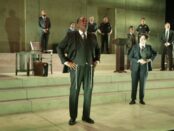Wedding Band
Alice Childress’ "Wedding Band," which is a difficult play to stage due to its shifts in tone, is a major rediscovery. However, it straddles a thin line between realism and romance and its poetry needs to be handled very carefully. Unlike the tamer "Trouble in Mind," "Wedding Band" has a very strong message and a good deal to say about racism in American in telling its sensitive interracial love story about a time when it was a love that dared not speak its name. While this production makes some problematic choices, the time has certainly arrived for this play to be returned to the American stage. [more]









